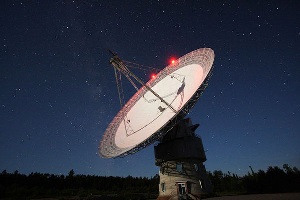Aug 3 2013
The public is invited to write a message that could be sent into space, in an attempt to communicate with an intelligent extraterrestrial civilization, as part of the University of Toronto’s 2013 Toronto Science Festival.
 The 46-metre radio telescope of the Algonquin Radio Observatory in Algonquin Park (photo by: Keith Vanderlinde, Dunlap Institute for Astronomy & Astrophysics)
The 46-metre radio telescope of the Algonquin Radio Observatory in Algonquin Park (photo by: Keith Vanderlinde, Dunlap Institute for Astronomy & Astrophysics)
“We are asking everyone to think about what you would say to an intelligent, extraterrestrial being,” says TSF organizer and astronomer Michael Reid of the Dunlap Institute for Astronomy and Astrophysics at U of T.
“Submit your message to the festival, and we will transmit two of them using the radio telescope of the Algonquin Radio Observatory in Algonquin Park.”
The messages will be transmitted to two stars, named Tau Ceti and Kepler 62. Because Tau Ceti is only 12 light-years from Earth, the radio signals will reach that system in 12 years. If someone is there to receive the message and respond, we could conceivably hear a reply in the year 2037.
“This is a fun opportunity for people to think about how to construct a message that intelligent extraterrestrials might be able to understand,” says Reid (pictured right). “It’s also an opportunity to explore the technological challenges involved in actually getting a message to another star.”
The public can submit their message, and find out more about the science of Messaging Extra-Terrestrial Intelligence, at the festival website at www.tsf.utoronto.ca.
The Toronto Science Festival will be a weekend-long public celebration of science, spotlighting leading researchers from the University of Toronto, and from around Canada and the U.S. It will include engaging keynote talks, lively panel discussions, film screenings, live musical and dance performances, hands-on activities, as well as a Café Scientifique “Brunch-with-a-Scientist” event.
The theme of the festival is 'Life in the Universe.' Speakers and panelists will explore such topics as the origin and evolution of life on Earth, extreme forms of life, even the search for intelligent life beyond our planet. Guests include planetary scientist Jim Bell, evolutionary biologist Sean B. Carroll, former Canadian astronaut Julie Payette, and Search for Extra-Terrestrial Intelligence pioneer Jill Tarter.
The festival will take place over the weekend of September 27, 28 and 29 at various venues on the university’s downtown St. George campus.
The festival website—tsf.utoronto.ca—contains the latest information about TSF events and speakers, and is where the public can purchase tickets. (Visit the website.) The public is also invited to get updates and join the conversation by following the festival on Twitter: @tosciencefest.
The Toronto Science Festival is being organized by U of T Science Engagement through the Senior Advisor to the President on Science Engagement and by the Dunlap Institute for Astronomy & Astrophysics, together with the departments of Astronomy & Astrophysics, Cell & Systems Biology, Ecology & Evolutionary Biology, Earth Sciences, the Canadian Institute for Theoretical Astrophysics, as well as Faculty of Arts & Science Alumni Relations, and University Advancement Alumni Relations. Partners outside the university include the Royal Astronomical Society of Canada.
Chris Sasaki is a writer with the Dunlap Institute for Astronomy & Astrophysics at the University of Toronto.
Source: http://www.utoronto.ca/